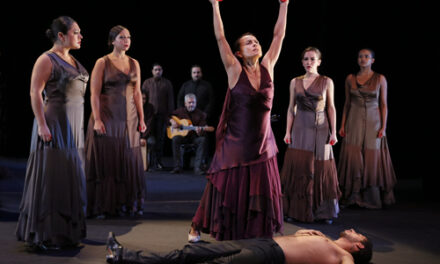Few operas are as boldly shocking as Tosca, composed by Giacomo Puccini in 1900. A love story situated in Rome in the late spring of 1800 during a time of political upheaval, this opera owes its enormous popularity to the sustained drama Puccini was able to infuse into the music. Often a single melodic line will dominate the orchestra, while on stage we anticipate the inevitable. At another moment the suspense of impending judgment is conveyed by an ominous, obstinate, off-beat pizzicato of the basses while we feel the torture of the prisoner in the dull thud of the bass drum. Maestro James Allbritten, who has led all Piedmont Opera productions of the last dozen years, directed the massed forces of the Winston-Salem Symphony, Piedmont Opera Chorus and Winston-Salem Youth Chorus with experience and authority. This is a difficult opera to conduct because of the high dramatic tension that requires constant attention to detail as well as to the “big picture.”
This is not to belittle the singing, which was extraordinary – and indeed, two arias stand out, “Vissi d’arte, vissi d’amore” (“I have lived for art, I have lived for love”) and “E lucevan le stelle” (“And the stars shine”) among the many additional occasions for the excellent cast to shine. But as befits the new century, the old operatic mold, with its arias and recitatives has been replaced by the new realism (verismo), laying bare the seamy side of lust and deceit in the continuously developing music while the plot, originated by French playwright Victorien Sardou, weaves its web of inevitability.
At a time when Rome was a police state, the Baron Scarpia was the chief of police and a cruel and heartless man. In a near-by church the painter Mario Cavaradossi has helped an escaped political prisoner (Angelotti) hide from the police. The beautiful and popular opera diva, Flora Tosca, the lover of the painter, catches the eye of the evil Scarpia who vows to seduce her and to use her to both capture the escapee and to rid himself of the rebellious painter.
With these givens, the plot unwinds inexorably to its tragic conclusion, but not before the pious and jealous diva has exacted her due! In the title role, soprano Jill Gardner was everything one could hope for in a beautiful and imperiously jealous diva – beauty, a lovely rich voice, and a superb sense of dramatic timing. The psychological climax of the drama takes place in the taut and tense second act, leading up to the famous aria (Vissi d’arte…) in which she questions “Why me?” when given the illusory choice of yielding to the nefarious demands of Scarpia in order to save her lover.
The antagonist in the opera is the powerful and suave Baron Scarpia, for whom the word love is replaced by lust, enacted with violence. I could not imagine a more perfect match for the role than Jake Gardner, whose smooth aristocratic arrogance was matched by an insinuating bass baritone voice of beauty and power. What a disgusting combination – but how convincing! The second act was all about this epitome of evil and how he might bring about the confession and condemnation of Mario and the fugitive Angelotti. At this point one must mention the excellent job done by Director Steven LaCosse throughout the drama and especially in Act II.
Mario, sung by Dinyar Vania, was at his best in the last act aria “E lucevan le stele” in which he reminisces about how much he loves Tosca and life in general, while on a parapet of the Castel Sant’Angelo, awaiting his execution by firing squad.
Other outstanding voices included the surprisingly robust and warm bass of Donald Hartmann in the role of the Sacristan of the Church Sant’Andrea della Valle and the rich and nuanced baritone of Andrew René in the role of Angelotti, the political prisoner escaped from Castel Sant’Angelo.
The production will be repeated on Tuesday. See our sidebar for details.











